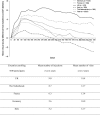Fundamental principles of an anti-VEGF treatment regimen: optimal application of intravitreal anti-vascular endothelial growth factor therapy of macular diseases
- PMID: 28527040
- PMCID: PMC5486551
- DOI: 10.1007/s00417-017-3647-4
Fundamental principles of an anti-VEGF treatment regimen: optimal application of intravitreal anti-vascular endothelial growth factor therapy of macular diseases
Abstract
Background: Intravitreal anti-vascular endothelial growth factor (VEGF) therapy is now considered the gold standard for the treatment of various retinal disorders. As therapy has evolved, so too have the treatment regimens employed by physicians in clinical practice; however, visual outcomes observed in the real world have typically not reflected those reported in clinical trials. Possible reasons for this include a lack of consensus on treatment regimens and a lack of clarity about what the aims of treatment should be.
Methods: The Vision Academy Steering Committee met to discuss the principles of an ideal treatment regimen, using evidence from the literature to substantiate each point. Literature searches were performed using the MEDLINE/PubMed database (cut-off date: March 2016) and restricted to English-language publications. Studies with fewer than ten patients were excluded from this review.
Results: The Steering Committee identified the following four key principles for the ideal treatment regimen for anti-VEGF management of retinal diseases: 1. Maximize and maintain visual acuity (VA) benefits for all patients 2. Decide when to treat next, rather than whether to treat now 3. Titrate the treatment intervals to match patients' needs 4. Treat at each monitoring visit.
Conclusions: It is proposed that the adoption of a proactive and more personalized approach in the clinic such as a treat-and-extend regimen will lead to benefits for both the patient and the physician, through a reduction in the associated treatment burden and better utilization of clinic resources. Implementation of the four principles should also lead to better VA outcomes for each patient, with a minimized risk of vision loss.
Keywords: Aflibercept; Anti–vascular endothelial growth factor; Retinal disease; Treat-and-extend; Treatment regimens; Visual acuity.
Conflict of interest statement
Funding
Bayer provided financial support in the form of medical writing funding to Porterhouse Medical Ltd.
The sponsor had no role in the design or conduct of this research.
Conflicts of interest
All authors certify that they have no affiliations with or involvement in any organization or entity with any financial interest (such as honoraria; educational grants; participation in speakers’ bureaus; membership, employment, consultancies, stock ownership, or other equity interest; and expert testimony or patent-licensing arrangements), or non-financial interest (such as personal or professional relationships, affiliations, knowledge, or beliefs) in the subject matter or materials discussed in this manuscript.
Bora Eldem: Allergan, Bausch & Lomb, Bayer, Novartis, Opthotec, Roche, Santen, Servier, Thea.
Alex Hunyor: Allergan, Bayer, Novartis.
Antonia Joussen: None.
Adrian Koh: Bayer.
Jean-François Korobelnik: Bayer, Novartis, Roche.
Paolo Lanzetta: Alcon, Alimera, Allergan, Bayer, Genentech, Lupin, Lutronic, Novartis, Roche,
Anat Loewenstein: Alcon, Allergan, Bayer, Notal Vision, Novartis.
Studies with human participants
This article does not contain any studies with human participants performed by any of the authors.
Figures





References
-
- Freund KB, Korobelnik J-F, Devenyi R, Framme C, Galic J, Herbert E, Hoerauf H, Lanzetta P, Michels S, Mitchell P, Monés J, Regillo C, Tadayoni R, Talks J, Wolf S. Treat-and-extend regimens with anti-VEGF agents in retinal diseases: a literature review and consensus recommendations. Retina. 2015;35:1489–1506. doi: 10.1097/IAE.0000000000000627. - DOI - PubMed
-
- Rogers S, McIntosh RL, Cheung N, Lim L, Wang JJ, Mitchell P, Kowalski JW, Nguyen H, Wong TY, International Eye Disease Consortium The prevalence of retinal vein occlusion: pooled data from population studies from the United States, Europe, Asia, and Australia. Ophthalmology. 2010;117:313–319. doi: 10.1016/j.ophtha.2009.07.017. - DOI - PMC - PubMed
-
- Wolf S. Diabetic macular oedema and the importance of vascular endothelial growth factor therapies in its treatment. Eur Ophthalmic Rev. 2014;8:53–60. doi: 10.17925/EOR.2014.08.01.i. - DOI
Publication types
MeSH terms
Substances
LinkOut - more resources
Full Text Sources
Other Literature Sources
Medical
Research Materials
Miscellaneous

